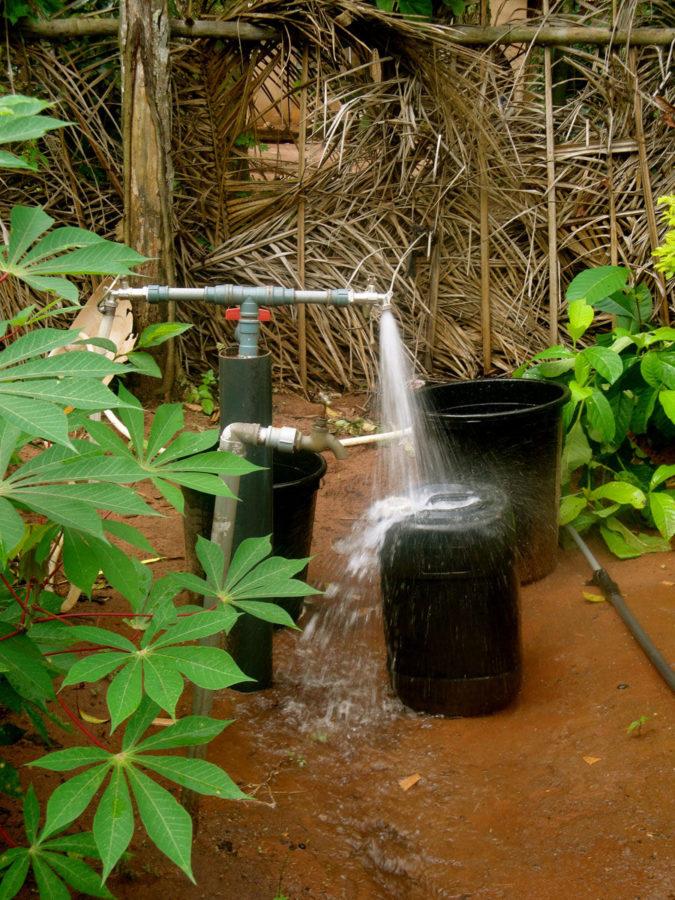Engineers Without Borders successfully provides clean water in remote Adu Achi
October 28, 2014
In many places around the world, poor sanitation is not an easy problem to fix. But the issue kills far more people each year than warfare, according to the World Health Organization.
In places like Nigeria, for example, approximately half of its population of 170,000 million people suffer from deficient water supply. Illnesses like Cholera, Typhoid Fever and Malaria have been a serious health concern for many Nigerians, with Malaria alone accounting for 20 percent of deaths of young children in the country.
Engineers Without Borders (EWB), a Registered Student Organization at the University, is doing everything it can to combat this issue.
The Nigeria Water Project is an undertaking that the Illinois branch of EWB has been working on since the summer of 2005. Its aim is to provide the people of the Nigerian village of Adu Achi with a clean, reliable source of water. During the region’s dry season, members of the village of 3,000 people would previously have to travel three kilometers up to six times a day just to reach a source of water. According to the EWB project page, “the water borne-illnesses caused by consumption of this water were a significant contributor to physical and psychological stresses.” The children of the village often missed school to make the trips to get water, and it would take up a lot of time for the women of the village as well, according to Ryan Migalla, project member and senior in Engineering.
Now, after years of making trips down to Nigeria to implement the water system design, water runs freely in Adu Achi several times a week.
Get The Daily Illini in your inbox!
This project was incepted by Nigerian immigrant Stan Chu Ilo, who grew up in the town of Adu Achi and witnessed firsthand how big the struggle was to get a source of water in his village, let alone a clean one. With the help of a non-government organization called the Canadian Samaritans for Africa, Ilo submitted a proposal to Engineers Without Boarders USA in the summer of 2004 and the project was later taken over by the University’s EWB branch in 2005. Since then, a group, which typically consists of one to three professional mentors and three to six students, has gone on to make periodic trips to survey, implement and regulate the new water system.
Migalla began work on this EWB project in his sophomore year, and it allowed him a hands-on way to apply what he learned in the classroom to the real world.
“I was very interested in EWB because I was eager to apply my problem-solving skills to something outside of the classroom and I wanted to help provide services that we take for granted to less fortunate people in the world,” Migalla said.
Today, the project stands on its own and the group members involved want to keep it that way.
Their current initiative now focuses on the sustainability of the system and what measures and materials they can provide to ensure the quality of the water system will maintain after they are no longer involved, said Emily Matijevich, a group member since her freshman year and junior in Engineering.
“I love how interdisciplinary our group is,” Matijevich said. “We all come from different backgrounds of engineering and have different skills and expertise to provide.”
It is also a project that has won awards, including the best student presentation at the National Groundwater Association’s Ground Water Summit in 2007. The water distribution system now serves the community of over 3000 in the town of Adu Achi, and the town deemed the ritualistic three kilometers trek to the nearest water source unnecessary for its villagers.
For the University’s EWB branch, getting to Nigeria year after year to continue working on the project hasn’t always been easy. In 2007, for example, travel safety questions and fundraising challenges kept the team from going back to finish work that summer, and were instead forced to go in the winter of that year.
However, for Migalla, the interaction with the people he’s met along the way has made every effort worth it.
“There are so many great anecdotes since everyone there was so friendly and welcoming,” Migalla said, speaking of the villagers of Adu Achi. “I really liked doing the health presentations … the kids at the elementary school were really into it and for the rest of the trip they would run up to us and demonstrate how to wash their hands and other things that we taught them. Every day we got to talk to different people and experience different things.”
Dina Betts, junior in Engineering, has also seen herself grow through the implementation of the EWB project.
“Being in EWB has allowed me to see the value of real work — work where the efforts I put in lead to a change in the quality of life for other people,” Betts said. “I can no longer be happy with a simple desk job where all I see are numbers eventually leading to some final product. I need to see my work come to fruition through positive change.”
Eliseo can be reached at [email protected].







